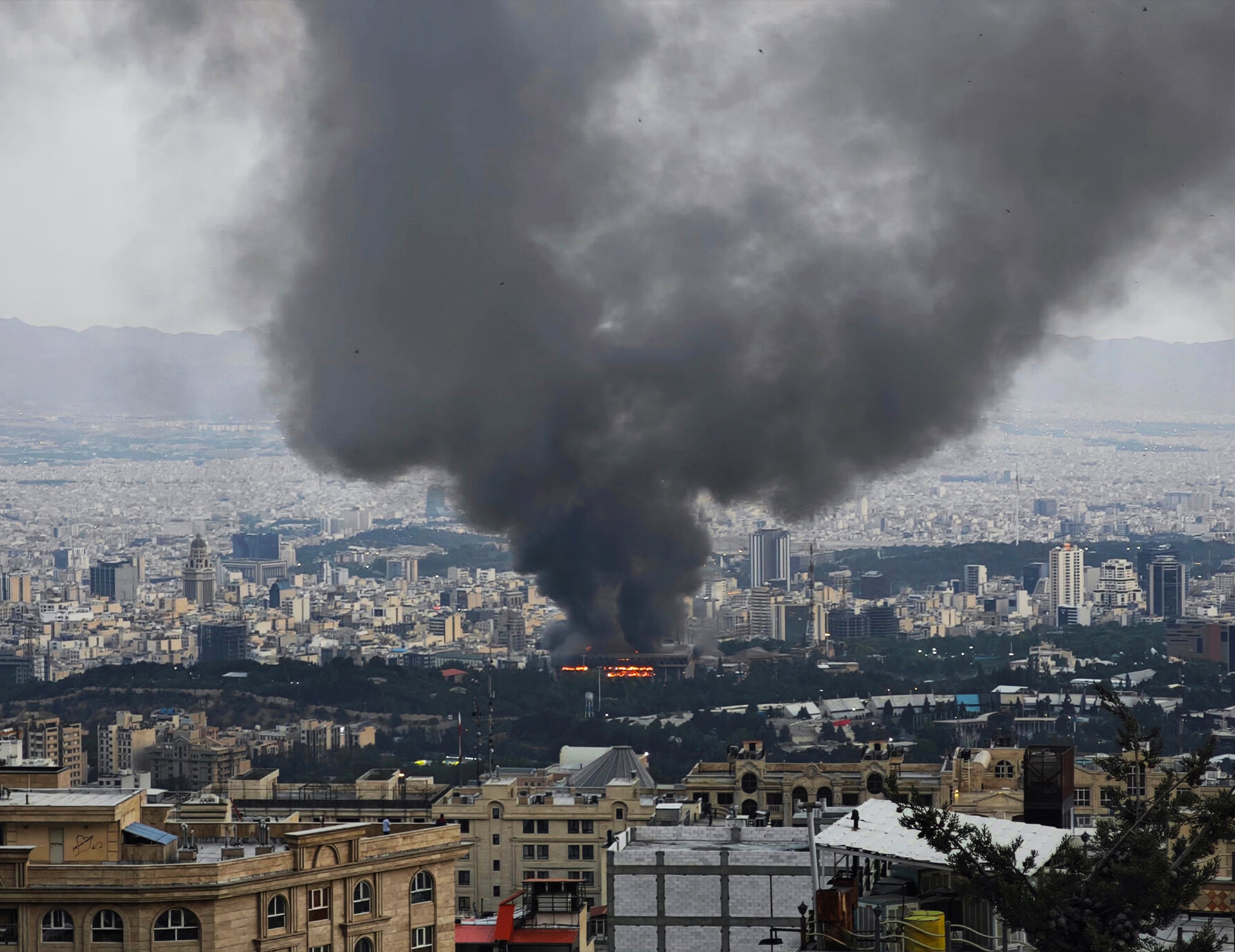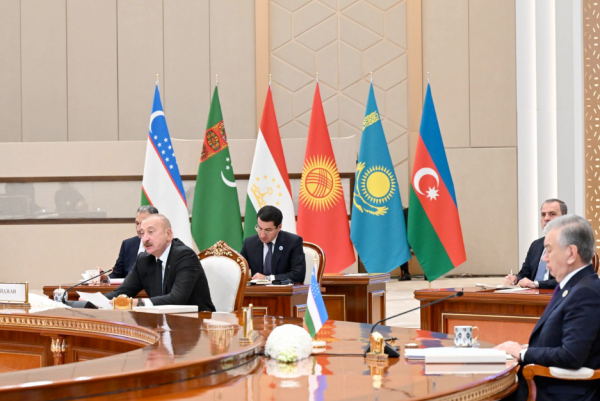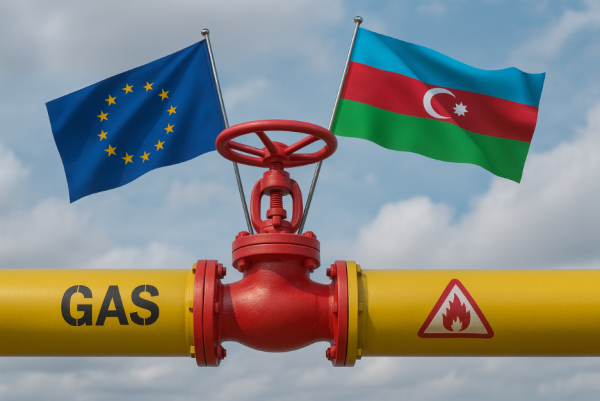Regional stakes in the Iran–Israel conflict: a view from the South Caucasus

The bombing of Iran by Israeli Air Forces on June 13, combined with an operation of eliminating the top rank of Iranian military and security officials, heralded the start of another major conflict in the world already living through the greatest wave of violence since World War II, and plunged the larger region in completely uncharted waters. The intensity of bombardments and Israel’s determination to completely eliminate any threat coming from Iran, combined with the latter’s tight ideological tenets that force the government to take a radical position, make the risks of intensification and spillover of this conflict, dangerously high. This new reality has immediate and lasting implications for all the actors in the region.
Our team presents its analysis of the war’s expected impact for a few selected actors. Mahammad Mammadov’s comments touch upon the implications of these events for South Caucasus and particularly Azerbaijan, the country tied by myriads of ties with both Iran and Israel. Murad Muradov looks at the conflict through the Russian prism, while Simona Scotti discusses the likely сonsequences for Türkiye.
Azerbaijan’s calculated neutrality towards the Israel-Iran War
Mahammad Mammadov
Israeli attack on Iran’s military and nuclear sites on June 13 marked an unprecedented escalation since 1979, sending shockwaves across the region and putting neighbors on high alert. Azerbaijan, a close Israeli ally in the South Caucasus, is increasingly exposed as fighting intensifies near its borders, with possible spill-over effects. In a carefully worded statement on June 13, Azerbaijan’s foreign ministry voiced serious concern over the Israeli military operation against Iran and condemned the broader escalation. The Assistant to Azerbaijan’s President, Hikmat Hajiyev, said Baku had taken proactive steps to brace itself against negative scenarios.
Azerbaijan kept its calm and refrained from taking sides when Iran and Israel traded first direct blows in April and October 2024. Baku prioritized regional stability to reap the benefits of new energy and transport projects while quietly advancing a calibrated two-track strategy – engaging Tehran as a wary neighbor and Israel as an indispensable security partner. With Iran, projects along the north-south transport corridor regained momentum, while cross-border energy cooperation advanced, culminating in President Pezeshkian’s visit to Baku in May as a symbol of deepening pragmatic partnership. With Israel, Baku doubled down on military and economic cooperation, finalizing follow-on Barak-8 air-defence deliveries, expanding joint drone production with local value-added, and inking new gas deals in Israeli waters.
In this context, the post-June 13 clashes, though notably more fatal than those of the previous year, appear manageable for Baku so long as they remain confined to Iran and Israel and ultimately pave the way for renewed diplomacy over Iran’s nuclear program. If the fog of war thickens and the conflict widens to draw in third actors – particularly the United States and Hezbollah – Azerbaijan could confront a plethora of challenges, ranging from refugee inflows to radioactive exposure.
Rising escalation could also blur Iran’s calculations about Azerbaijani neutrality. For years, Azerbaijan’s growing alliance with Israel has led some in the upper echelons of power in Tehran to suspect Baku’s potential complicity in a would-be Israeli attack. In a familiar pattern, after June 13, some media channels close to the Supreme Leader’s office and the IRGC insinuated Azerbaijan’s backing for Israeli operations, with hardline MPs warning of retaliation should Baku permit use of its airspace or territory for strikes on Iran.
If the recent past is a guide, such rhetoric is unlikely to crystallize into state policy under current circumstances, as Azerbaijan has consistently signaled its commitment to non-involvement. Such a scenario would open Pandora’s Box for Baku, putting national security at huge risk. On June 14, on a phone call with his Iranian counterpart, Azerbaijan’s Foreign Minister Jeyhun Bayramov said, “the territory of Azerbaijan cannot and will not be used by any country to take action against a third party, including neighboring and friendly Iran.” Meanwhile, responding to claims that Baku had enlisted ethnic Azerbaijanis in Iran to assist Israeli operations, Hikmat Hajiyev dismissed them as baseless and part of a deliberate disinformation campaign.
Israel seems to have engineered aerial routes enabling its large numbers of fighter aircraft to reach Iranian nuclear sites – deep into Iranian territory – with heavy payloads, without touching down on foreign soil. Given the limited range of its fighter jets, the IAF has likely devised novel aerial refueling strategies to extend operational reach for long-distance strike missions. One theory holds that Israel, with U.S. support, modified its F-35s with external drop tanks to achieve extended range without mid-air refueling or sacrificing stealth needed for penetrating Iranian defenses. It would significantly ease the strain on Israel’s aging and limited fleet of refueling tankers, which currently support the F-15I fighter aircraft, allegedly its primary platform for delivering bunker-buster bombs against Iran’s fortified nuclear facilities. Furthermore, Mossad’s well-crafted sabotage of Iran’s air-defense systems before the attack likely shortened the time its bomb-carrying aircraft had to spend inside Iran.
An expanded theater of war risks derailing Azerbaijan’s efforts to anchor itself at the crossroads of regional connectivity, a policy it has invested significant political and economic capital in recent years. Although mounting instability in the Middle East and Eastern Europe enhances the strategic relevance of Baku’s Middle Corridor, war-driven strategic volatility casts a long shadow over prospects for advancing major infrastructure projects in the wider neighborhood. Israel’s growing latitude in Iranian airspace, marked by strikes on critical infrastructure, threatens to erode confidence in the north–south transport corridor as a reliable trade route.
A humanitarian exodus remains a distinct possibility, one that Baku may be quietly factoring in its contingency planning. With millions of ethnic Azerbaijanis residing in Iran, any mass inflow into Azerbaijan would carry significant political and social implications, putting serious stress on the country’s economy. Meanwhile, should Iran’s central power falter, the resulting vacuum could spark ethnic clashes affecting Azerbaijani communities, raising pressure on Baku to intervene on behalf of its southern brethren.
Israel’s ongoing strikes on Iran’s nuclear facilities – particularly in Fordow and Natanz – have raised fears of radioactive contamination in Azerbaijan and neighboring countries. Azerbaijan’s mobile radiation-survey teams deployed to the southern border with Iran have not detected any contamination. Armenian specialists in the border province of Syunik came to the same conclusion. Yet, given that Israeli fighter jets would likely need to carry out repeated strikes to inflict serious damage on Iran’s deeply buried nuclear facilities, the risk of nuclear radiation remains tangible. The success of those operations will, to a great extent, depend on whether the United States shifts gears and directly supports Israeli attacks. Washington’s advanced Massive Ordnance Penetrator GBU-57 is one of the few munitions capable of penetrating hardened targets such as Fordow, a key uranium enrichment site near the city of Qom.
Trump’s recent remarks and signals of U.S. military repositioning in the region suggest that Washington may be edging closer to direct involvement unless Tehran alters course. That scenario could unleash a cascade of escalation, as Iran may respond by hitting American military bases in the Gulf, disrupting maritime traffic in the Strait of Hormuz, or attacking critical oil installations. The resulting breakdown in Iran’s socio-economic stability would turn it into a weak, yet dangerously unpredictable neighbor – an outcome Azerbaijan would be keen to avoid. Neither Iran’s dash for nuclear weapons to guarantee its survival bodes well for Baku. On the one hand, it could trigger a destabilizing arms race in the region, with far-reaching consequences for the broader security architecture. On the other hand, it would shift the asymmetry in bilateral relations further in Iran’s favor. For Baku, the ideal scenario would be the cessation of hostilities and Iran and the U.S. returning to nuclear negotiations. A deal that curbs Iran’s nuclear ambitions while placing limits on its conventional forces and regional proxies, in return for partial sanctions relief, would align well with Azerbaijan’s strategic interests. While the Iranian opposition is but one of several obstacles, a changing geopolitical context would inevitably affect the broader equation concerning the future of the Zangezur Corridor.
The implications of the Iranian war for Moscow
Murad Muradov
The unfolding geopolitical dynamics surrounding a potential large-scale conflict between Israel and Iran may carry profound implications for Russia’s foreign policy. At the center of this evolving landscape is Ukraine, whose war effort increasingly relies on sustained Western support. However, Western attention, particularly military aid, may significantly dwindle in the face of escalating crises elsewhere. A protracted conflict in the Middle East, especially if Israel demands missile defense and other kinds of support, could divert critical American and NATO resources. Given that Israel has already demonstrated vulnerabilities in its aerial defense, the U.S. and key allies are unlikely to refuse such requests. As a result, the probability of a successful Russian offensive and possible takeover of major urban centers in Eastern Ukraine would grow considerably.
Another major consequence of the escalation is the potential disruption of global energy supplies. It is already clear that latest European initiative of lowering Russian oil price ceiling from $60 to $45 per barrel, is hardly tenable in the new situation. A sharp rise in oil prices, potentially catastrophic if Iran blocks the Strait of Hormuz, could push European countries to ease sanctions and increase fuel purchases from Russia. In return, Moscow may demand a softening of sanctions or reductions in Western assistance to Ukraine, thereby weakening Ukraine’s position and undermining its prospects for a favorable resolution of the war.
Despite a strategic partnership agreement with Tehran, Russia has signaled its interest in playing a mediating role between Iran and Israel. Moscow has even floated ideas such as storing Iranian uranium in exchange for Tehran halting its nuclear program. This shows that Russia is not fully aligned with Iran’s regional ambitions. Israel, notably one of the few Western-aligned nations maintaining relatively stable relations with Moscow, shares interdependent interests with Russia in several domains. Supporting Iran outright would be a strategically risky choice for Moscow with uncertain benefits. Instead, the Kremlin appears poised to use the conflict to elevate its global leverage, positioning itself as a necessary intermediary and trading its diplomatic role for sanction relief and a full-fledged return to the negotiating table with the West.
This approach explains why Russia may also oppose a decisive Israeli victory. A long, bitter conflict would better serve Moscow’s interest by creating conditions conducive to its geopolitical narrative: that global stability requires a renewed, realist framework for international order - something akin to a modern-day Yalta Conference, grounded in spheres of influence and balance-of-power principles. Influential Russian analyst Andrey Kortunov has confirmed that this scenario aligns with Moscow’s strategic interests. This is why certain support from Russia may arrive if a real risk of Iranian government collapse and national disintegration arises. Russia is not immune to potential negative impacts either. Should it refrain from openly backing Iran, Beijing may interpret Moscow’s stance as a sign of unreliability.
This could trigger a fundamental reassessment of the Sino-Russian сomprehensive strategic partnership, one of the key assets in President Xi’s diplomatic treasury. China might begin to pursue a more autonomous and assertive role in Central Asia, the Middle East, and Eastern Europe, weakening the current Russia-China alignment. Moreover, Iran’s heavy reliance on Russian air defense systems poses another risk. A visible failure of these systems in conflict would further erode global confidence in Russian military technology, already under scrutiny after setbacks in Ukraine, Karabakh, and elsewhere. This could significantly damage Russia’s arms export sector and its broader ability to sustain strategic security partnerships.
In a worst-case scenario for Moscow, Israel could succeed in toppling the current Iranian regime and installing a secular, pro-Western government. Such a transformation would profoundly alter the Middle Eastern geopolitical landscape, potentially turning Iran into an Israeli ally and sharply reducing Russia’s regional influence.
In conclusion, the trajectory of the Israel-Iran conflict could be a turning point for Russia’s foreign policy. A swift Israeli victory might compel Moscow to seek rapprochement with a potentially returning Trump administration, offering concessions to secure its place in a U.S.-led global order. Conversely, a prolonged and destructive war could strengthen hardline, “Third Worldist” elements within Russia, who advocate for a definitive break with the West and the establishment of an alternative global system rooted in multipolarity and realpolitik. Either outcome would mark a significant shift in Russia’s international posture.
Türkiye’s Middle East diplomacy
Simona Scotti
The escalating conflict between Iran and Israel is rapidly evolving into one of the most consequential crises of recent years, threatening to engulf the wider Middle East. For Türkiye, a country whose foreign policy increasingly hinges on regional stability, the implications are both immediate and far-reaching. As missiles fly between Tehran and Tel Aviv, Ankara finds itself balancing alliances, regional goals, and domestic challenges.
President Recep Tayyip Erdoğan’s recent diplomatic offensive offers a glimpse into Türkiye’s foreign policy calculus. Over the past few days, he has held phone conversations with U.S. President Donald Trump, Russian President Vladimir Putin, and Iranian President Masoud Pezeshkian. The message has been consistent: Türkiye is ready to serve as a facilitator to help de-escalate tensions and restore nuclear negotiations between Washington and Tehran, which collapsed just days ago following Israel’s airstrikes over Iran. In remarks delivered after Monday’s cabinet session, Erdoğan asserted that Israel’s current military strategy could ultimately backfire, while also stressing that Iran’s nuclear program should be tackled through diplomatic engagement rather than military confrontation.
These moves are rooted in Türkiye’s core interest in maintaining a calm Middle East. The country is already hosting millions of Syrian refugees and grappling with economic strain. A full-scale war between Iran and Israel, with the potential involvement of the United States, would likely both inflame sectarian tensions across the region and trigger a fresh wave of displacement. Already, Türkiye is witnessing an uptick in Iranians seeking temporary refuge.
The Turkish Ministry of Foreign Affairs issued a sharply worded statement following Israel’s airstrike on Iran: “We condemn in the strongest terms the Israeli airstrike on Iran. This attack, which constitutes a blatant violation of international law, is a provocation that serves Israel's strategic destabilization policy in the region”. While Türkiye has long criticised Israeli policy in the occupied Palestinian territories, particularly following the Mavi Marmara incident in 2010, relations had begun to improve after the Erdoğan-Netanyahu meeting in New York in September 2024. That detente quickly eroded following Israel’s recent military campaign in Gaza, which was widely condemned for its high civilian toll. Türkiye responded by joining South Africa’s genocide case against Israel at the International Court of Justice, and imposing a range of economic restrictions.
While Türkiye has criticised Israel, its ties with Iran in the lead-up to the escalation have been somewhat uneasy. Ankara remains concerned about Tehran’s regional activities, particularly its use of proxy forces in Iraq and Syria. Turkish Foreign Minister Hakan Fidan recently criticised Iran’s reliance on non-state actors, arguing that “Iran has had to sacrifice much more to sustain its influence in Iraq and Syria”, and warning of the destabilising effects of its militia networks. Iranian-backed groups in northern Iraq, including those linked to the Popular Mobilization Forces, have long hindered Turkish military operations targeting PKK positions, while in Syria Iranian influence competes with Turkish-backed actors. Domestically, Ankara is also contending with new dynamics related to the Kurdish issue. In May, after a period of negotiations and dialogue, the PKK announced its dissolution, bringing an end to a decades-long armed conflict with Türkiye. However, a destabilised Iran could upset these developments. Ethnic Kurdish groups in Iran, including PJAK, may become more assertive in the absence of strong state control, potentially reigniting cross-border activism that could spill over into Türkiye.
In the South Caucasus, Türkiye’s active support for Azerbaijan during and after the 2020 Karabakh war, and its endorsement of the Azerbaijan–Armenia peace process, have contributed to growing friction with Iran. Tehran views the proposed Zangezur Corridor, which would link mainland Azerbaijan to Nakhchivan via southern Armenia, as a geopolitical threat that could undermine its influence in the region and weaken its position among ethnic Azerbaijanis in northern Iran. From Ankara’s perspective, however, the corridor project is part of a broader effort to strengthen regional connectivity and economic integration, and Tehran’s opposition is increasingly seen as obstructionist.
Turning back to the current escalation, developments on the U.S. front raise additional concerns. The diversion of the aircraft carrier USS Nimitz from the Indo-Pacific to the Gulf, the deployment of around 30 KC-135 and KC-46 tankers to U.S. military bases in several European countries, and President Trump’s order on Truth Social to evacuate Tehran and his demand for Tehran’s unconditional surrender suggest that Washington is preparing for possible direct involvement. Such a development would have direct consequences for Türkiye. Any military confrontation in the Gulf would likely disrupt energy flows through the Strait of Hormuz, pushing up global oil prices and deepening inflationary pressures on the Turkish economy. Moreover, increased U.S. military presence in the Eastern Mediterranean and Gulf would further complicate Türkiye’s efforts to assert itself diplomatically, particularly if NATO becomes more directly involved.









